Thomas James Richards, Diaries, Transcript Vol. 3, 26 January to 8 November 1916 - Part 26
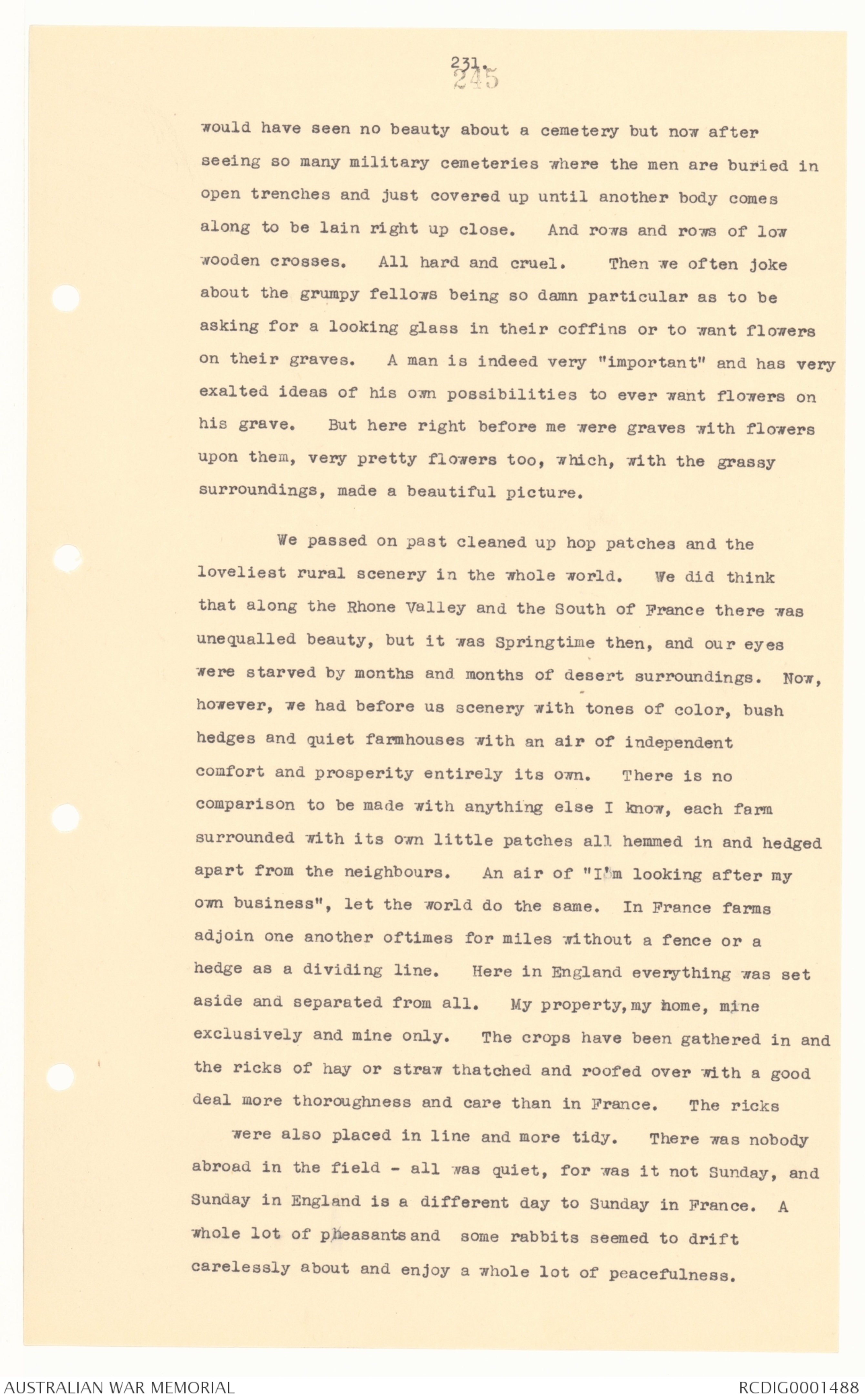
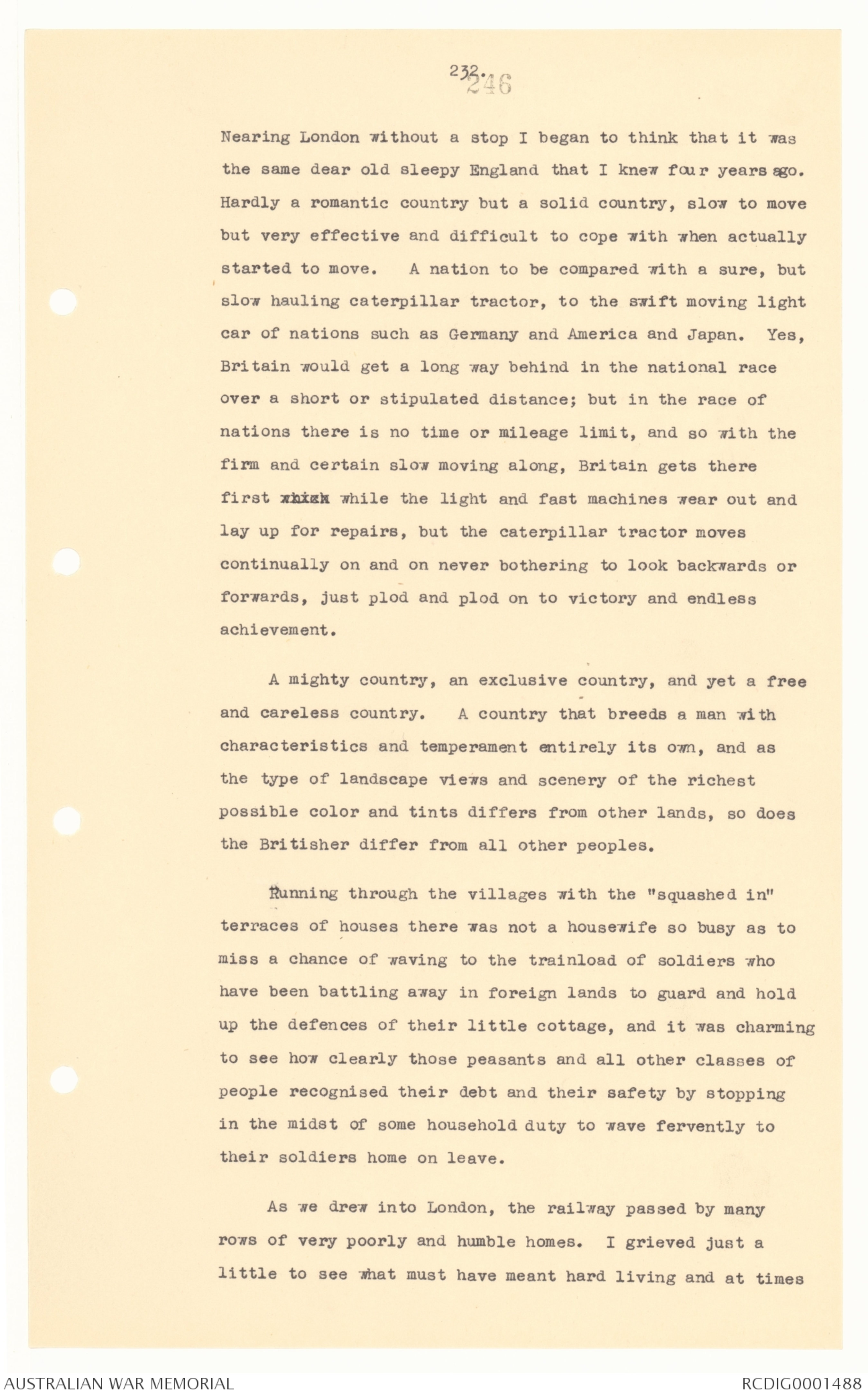
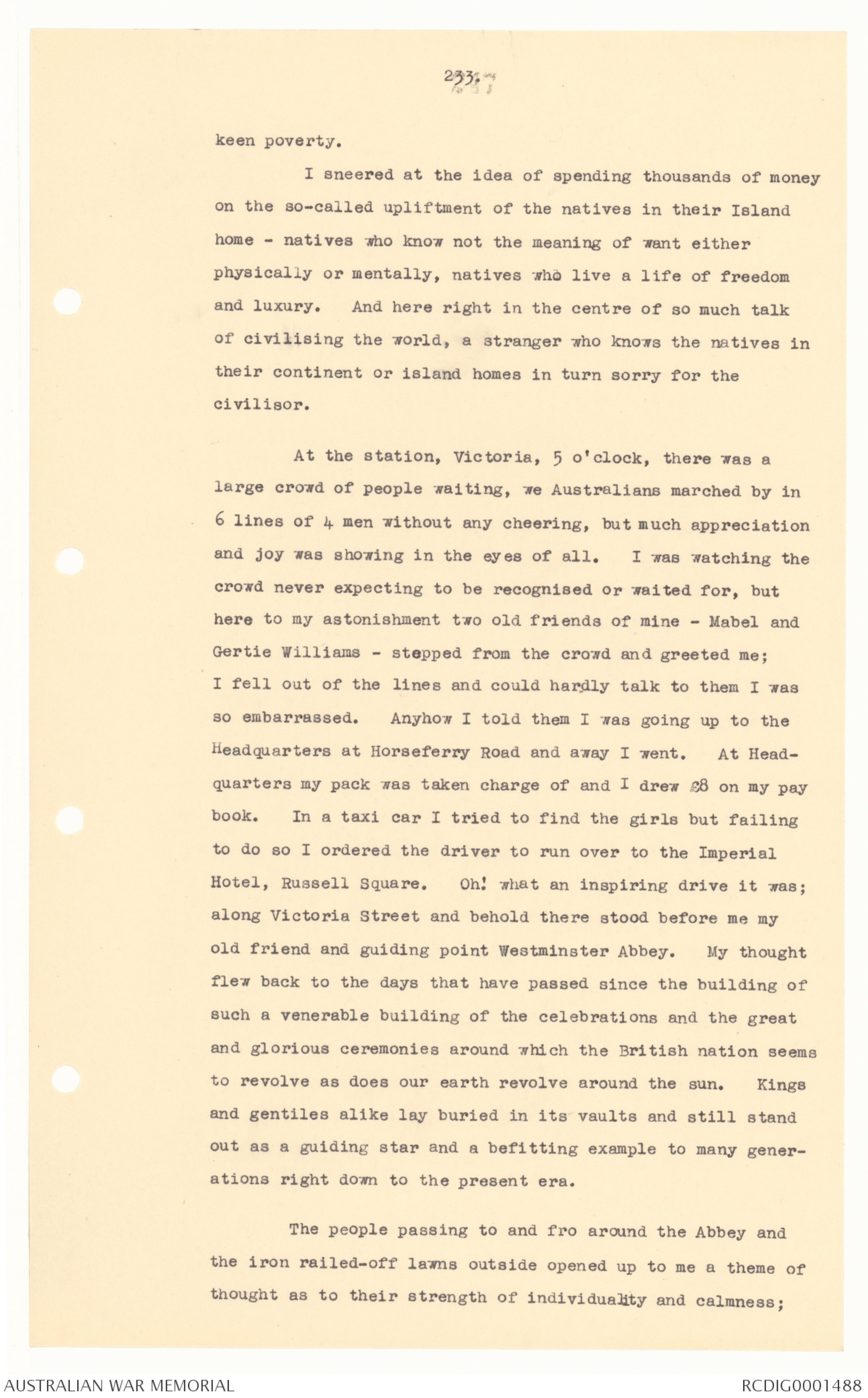
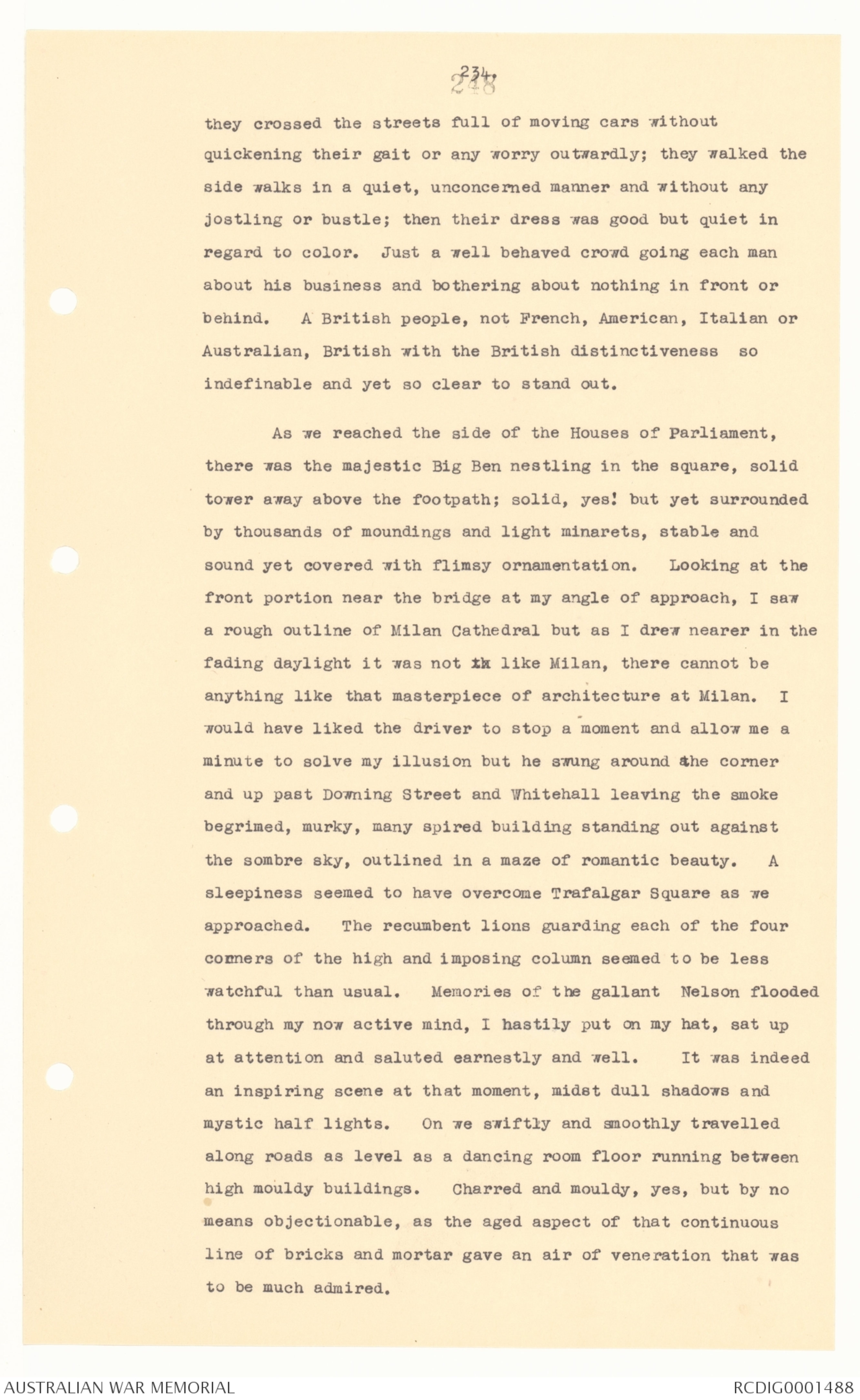
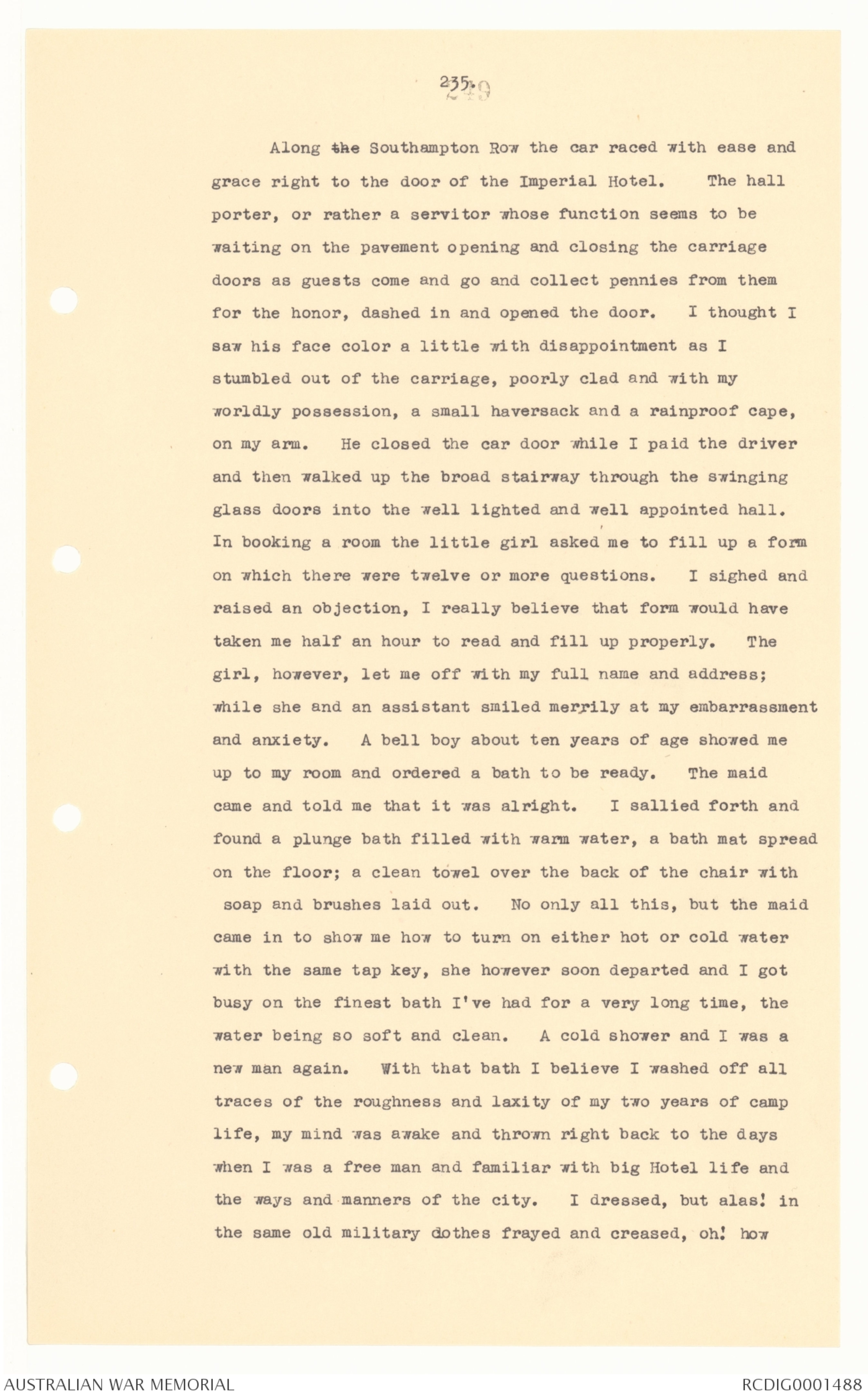
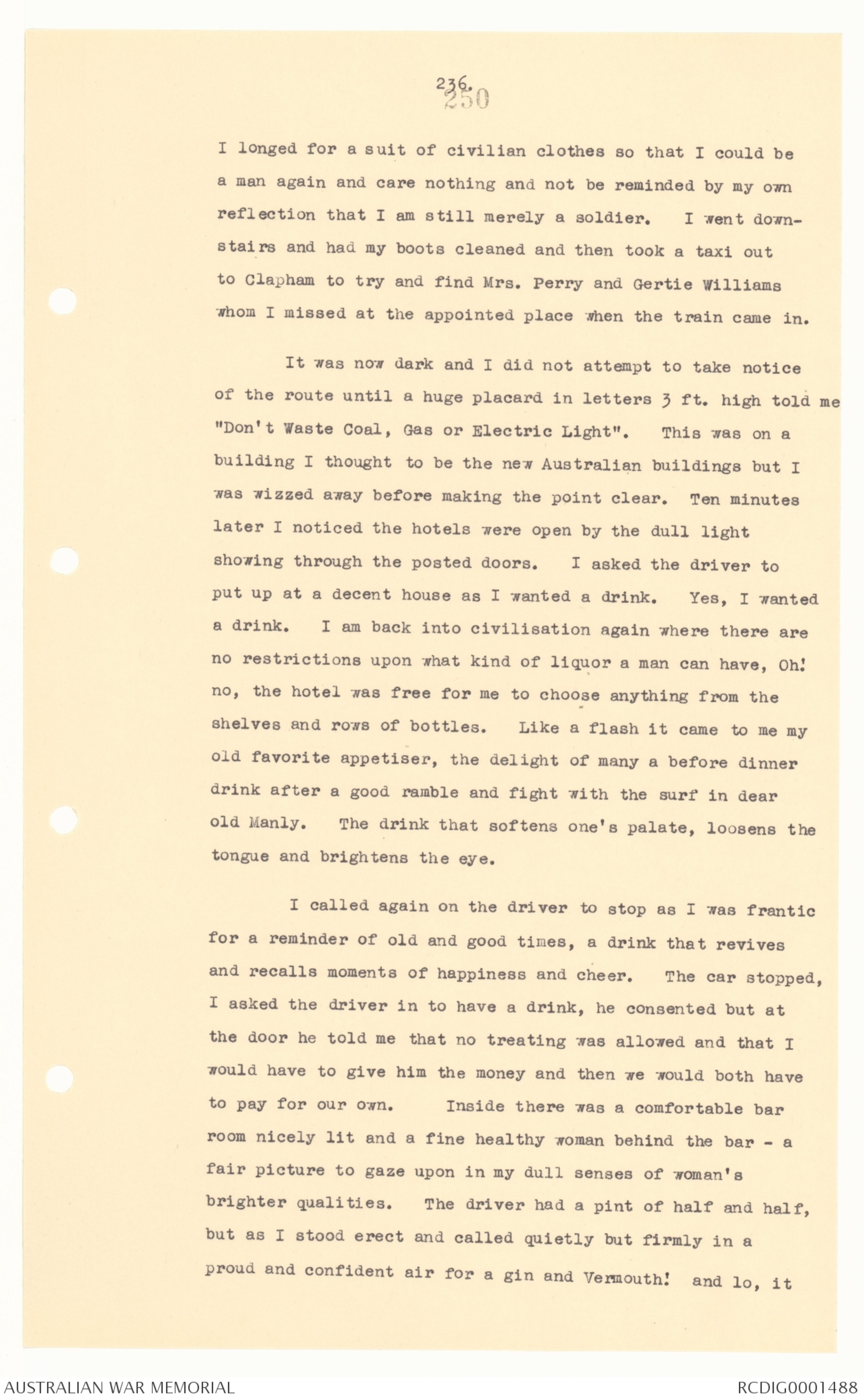
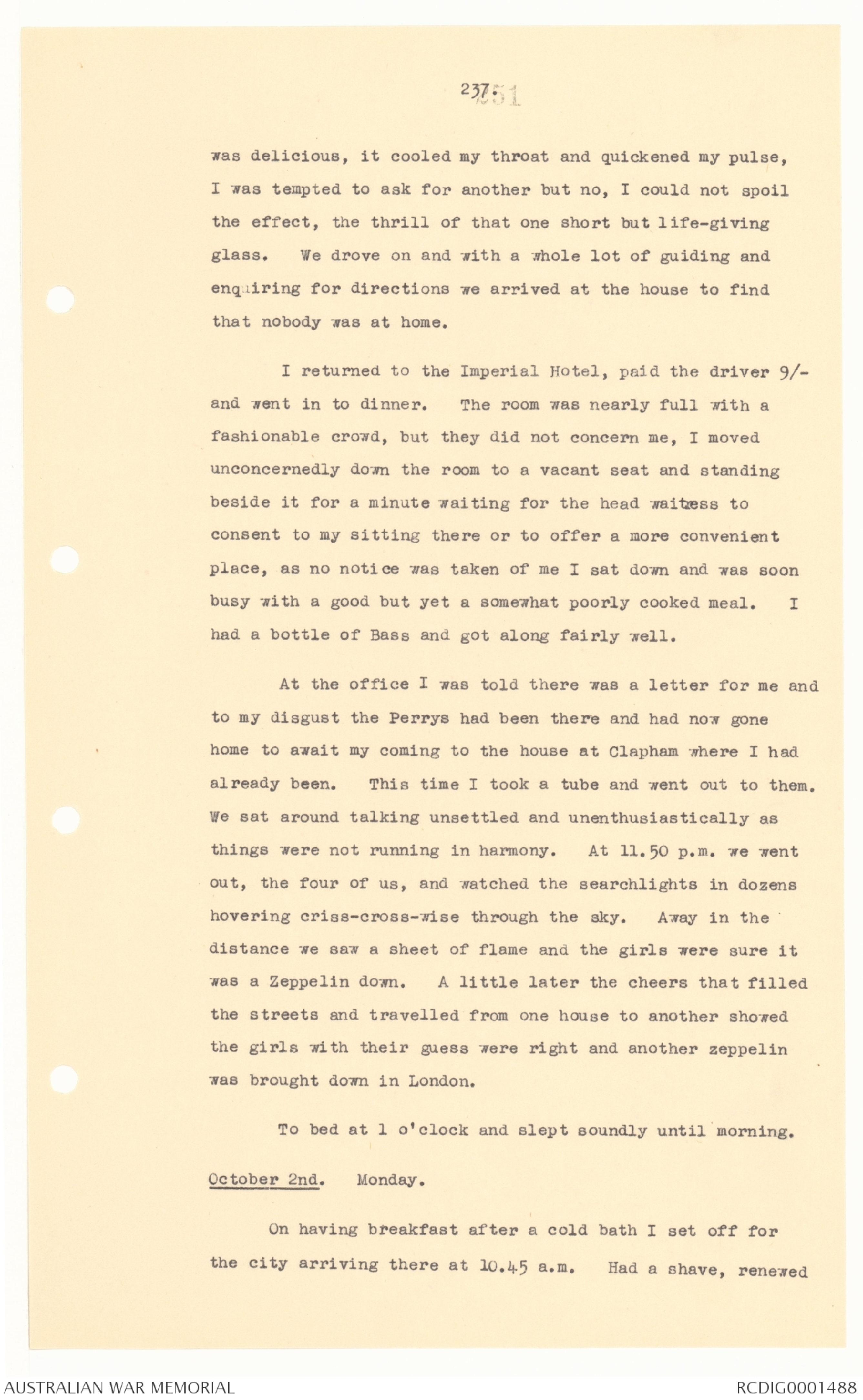
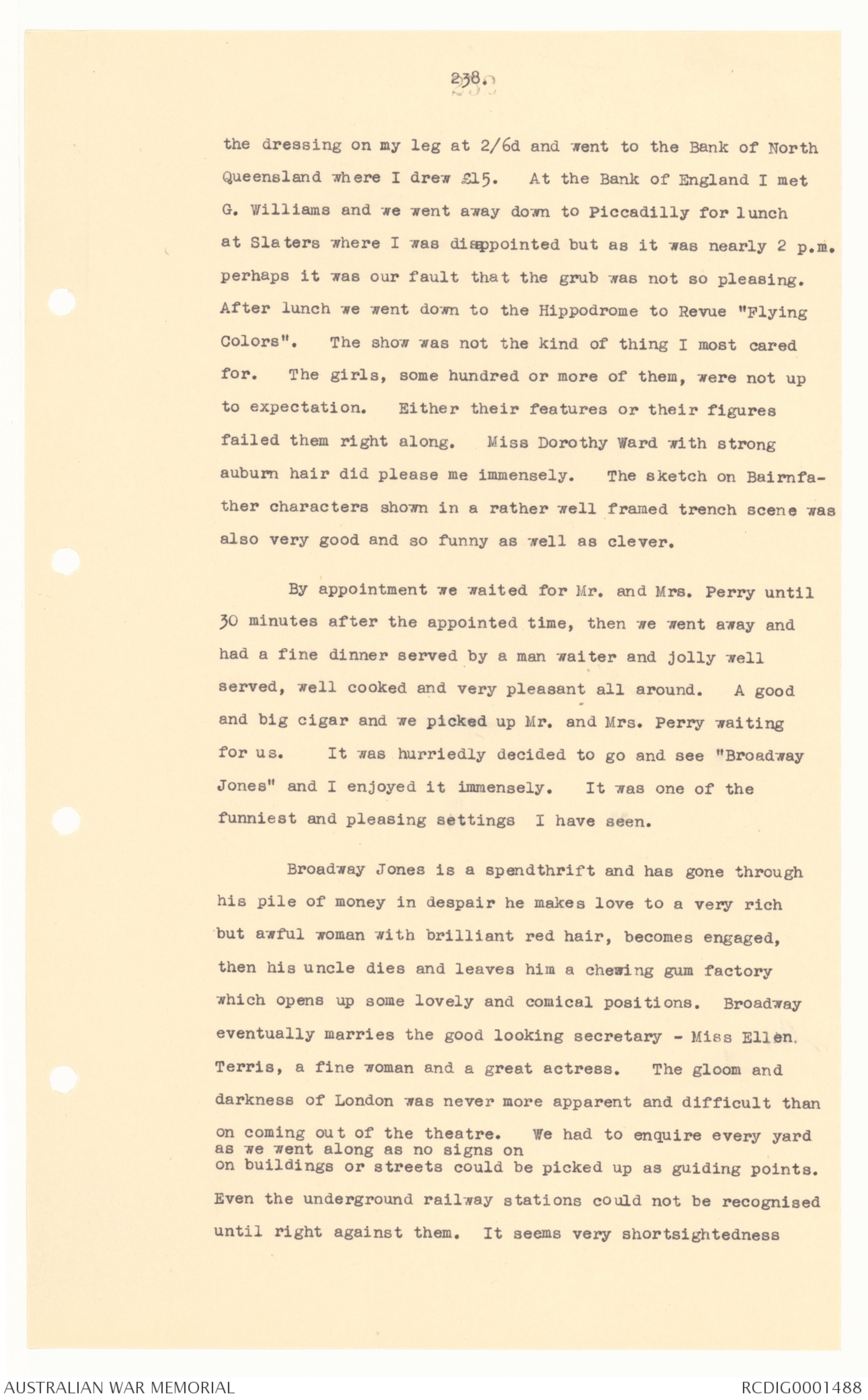
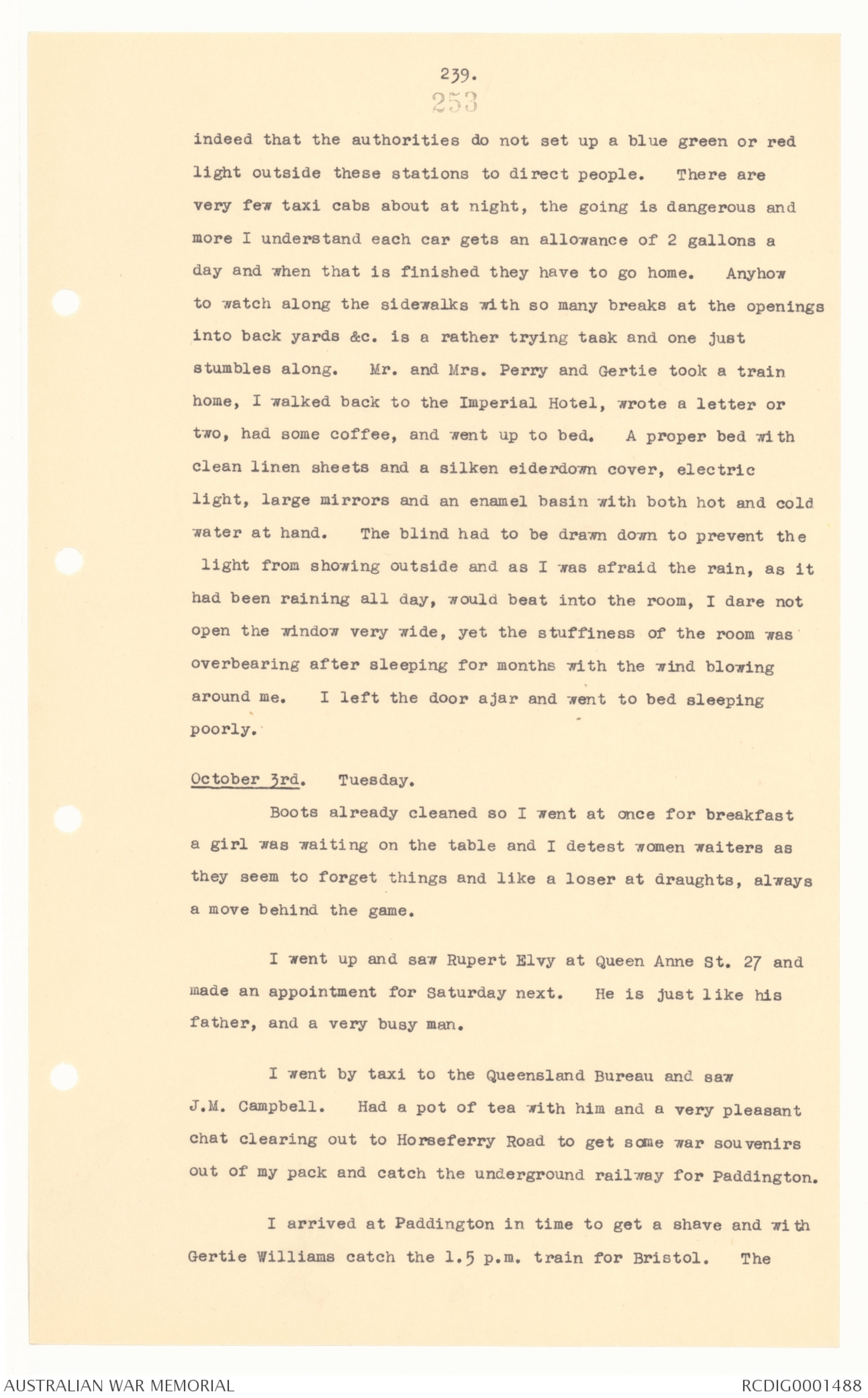
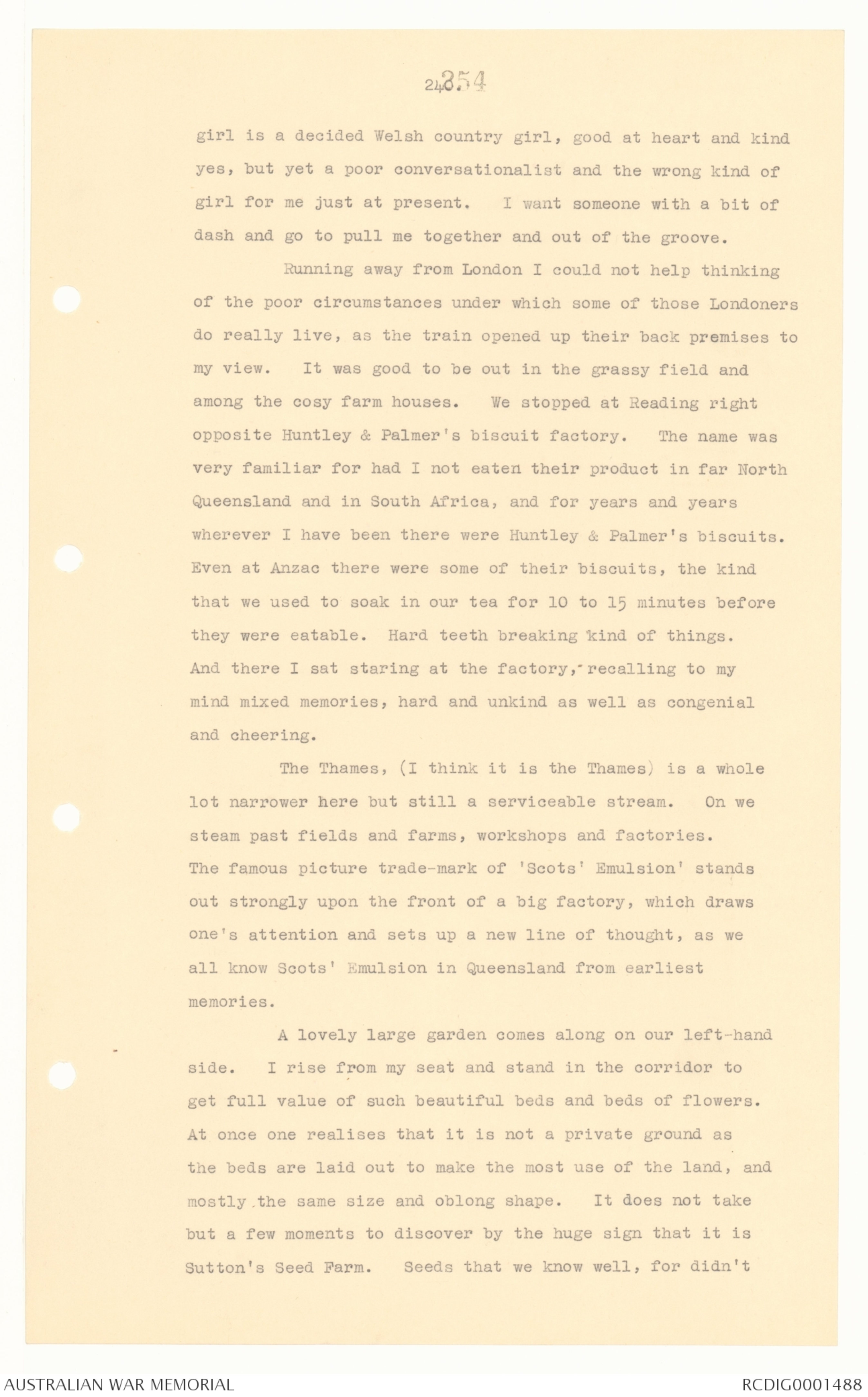
231.
245
would have seen no beauty about a cemetery but now after
seeing so many military cemeteries where the men are buried in
open trenches and just covered up until another body comes
along to be lain right up close. And rows and rows of low
wooden crosses. All hard and cruel. Then we often joke
about the grumpy fellows being so damn particular as to be
asking for a looking glass in their coffins or to want flowers
on their graves. A man is indeed very "important" and has very
exalted ideas of his own possibilities to ever want flowers on
his grave. But here right before me were graves with flowers
upon them, very pretty flowers too, which, with the grassy
surroundings, made a beautiful picture.
We passed on past cleaned up hop patches and the
loveliest rural scenery in the whole world. We did think
that along the Rhone Valley and the South of France there was
unequalled beauty, but it was Springtime then, and our eyes
were starved by months and months of desert surroundings. Now,
however, we had before us scenery with tones of color, bush
hedges and quiet farmhouses with an air of independent
comfort and prosperity entirely its own. There is no
comparison to be made with anything else I know, each farm
surrounded with its own little patches all hemmed in and hedged
apart from the neighbours. An air of "I'm looking after my
own business", let the world do the same. In France farms
adjoin one another oftimes for miles without a fence or a
hedge as a dividing line. Here in England everything was set
aside and separated from all. My property, my home, mine
exclusively and mine only. The crops have been gathered in and
the ricks of hay or straw thatched and roofed over with a good
deal more thoroughness and care than in France. The ricks
were also placed in line and more tidy. There was nobody
abroad in the field - all was quiet, for was it not Sunday, and
Sunday in England is a different day to Sunday in France. A
whole lot of pheasants and some rabbits seemed to drift
carelessly about and enjoy a whole lot of peacefulness.
232.
246
Nearing London without a stop I began to think that it was
the same dear old sleepy England that I knew four years ago.
Hardly a romantic country but a solid country, slow to move
but very effective and difficult to cope with when actually
started to move. A nation to be compared with a sure, but
slow hauling caterpillar tractor, to the swift moving light
car of nations such as Germany and America and Japan. Yes,
Britain would get a long way behind in the national race
over a short or stipulated distance; but in the race of
nations there is no time or mileage limit, and so with the
firm and certain slow moving along, Britain gets there
first which while the light and fast machines wear out and
lay up for repairs, but the caterpillar tractor moves
continually on and on never bothering to look backwards or
forwards, just plod and plod on to victory and endless
achievement.
A mighty country, an exclusive country, and yet a free
and careless country. A country that breeds a man with
characteristics and temperament entirely its own, and as
the type of landscape views and scenery of the richest
possible color and tints differs from other lands, so does
the Britisher differ from all other peoples.
Running through the villages with the "squashed in"
terraces of houses there was not a housewife so busy as to
miss a chance of waving to the trainload of soldiers who
have been battling away in foreign lands to guard and hold
up the defences of their little cottage, and it was charming
to see how clearly those peasants and all other classes of
people recognised their debt and their safety by stopping
in the midst of some household duty to wave fervently to
their soldiers home on leave.
As we drew into London, the railway passed by many
rows of very poorly and humble homes. I grieved just a
little to see what must have meant hard living and at times
233.
257
keen poverty.
I sneered at the idea of spending thousands of money
on the so-called upliftment of the natives in their Island
home - natives who know not the meaning of want either
physically or mentally, natives who live a life of freedom
and luxury. And here right in the centre of so much talk
of civilising the world, a stranger who knows the natives in
their continent or island homes in turn sorry for the
civilisor.
At the station, Victoria, 5 o'clock, there was a
large crowd of people waiting, we Australians marched by in
6 lines of 4 men without any cheering, but much appreciation
and joy was showing in the eyes of all. I was watching the
crowd never expecting to be recognised or waited for, but
here to my astonishment two old friends of mine - Mabel and
Gertie Williams - stepped from the crowd and greeted me;
I fell out of the lines and could hardly talk to them I was
so embarrassed. Anyhow I told them I was going up to the
Headquarters at Horseferry Road and away I went. At Headquarters
my pack was taken charge of and I drew £8 on my pay
book. In a taxi car I tried to find the girls but failing
to do so I ordered the driver to run over to the Imperial
Hotel, Russell Square. Oh! what an inspiring drive it was;
along Victoria Street and behold there stood before me my
old friend and guiding point Westminster Abbey. My thought
flew back to the days that have passed since the building of
such a venerable building of the celebrations and the great
and glorious ceremonies around which the British nation seems
to revolve as does our earth revolve around the sun. Kings
and gentiles alike lay buried in its vaults and still stand
out as a guiding star and a befitting example to many generations
right down to the present era.
The people passing to and fro around the Abbey and
the iron railed-off lawns outside opened up to me a theme of
thought as to their strength of individualty and calmness;
234.
248
they crossed the streets full of moving cars without
quickening their gait or any worry outwardly; they walked the
side walks in a quiet, unconcerned manner and without any
jostling or bustle; then their dress was good but quiet in
regard to color. Just a well behaved crowd going each man
about his business and bothering about nothing in front or
behind. A British people, not French, American, Italian or
Australian, British with the British distinctiveness so
indefinable and yet so clear to stand out.
As we reached the side of the Houses of Parliament,
there was the majestic Big Ben nestling in the square, solid
tower away above the footpath; solid, yes! but yet surrounded
by thousands of moundings and light minarets, stable and
sound yet covered with flimsy ornamentation. Looking at the
front portion near the bridge at my angle of approach, I saw
a rough outline of Milan Cathedral but as I drew nearer in the
fading daylight it was not xx like Milan, there cannot be
anything like that masterpiece of architecture at Milan. I
would have liked the driver to stop a moment and allow me a
minute to solve my illusion but he swung around the corner
and up past Downing Street and Whitehall leaving the smoke
begrimed, murky, many spired building standing out against
the sombre sky, outlined in a maze of romantic beauty. A
sleepiness seemed to have overcome Trafalgar Square as we
approached. The recumbent lions guarding each of the four
corners of the high and imposing column seemed to be less
watchful than usual. Memories of the gallant Nelson flooded
through my now active mind, I hastily put on my hat, sat up
at attention and saluted earnestly and well. It was indeed
an inspiring scene at that moment, midst dull shadows and
mystic half lights. On we swiftly and smoothly travelled
along roads as level as a dancing room floor running between
high mouldy buildings. Charred and mouldy, yes, but by no
means objectionable, as the aged aspect of that continuous
line of bricks and mortar gave an air of veneration that was
to be much admired.
235.
249
Along the Southampton Row the car raced with ease and
grace right to the door of the Imperial Hotel. The hall
porter, or rather a servitor whose function seems to be
waiting on the pavement opening and closing the carriage
doors as guests come and go and collect pennies from them
for the honor, dashed in and opened the door. I thought I
saw his face color a little with disappointment as I
stumbled out of the carriage, poorly clad and with my
worldly possession, a small haversack and a rainproof cape,
on my arm. He closed the car door while I paid the driver
and then walked up the broad stairway through the swinging
glass doors into the well lighted and well appointed hall.
In booking a room the little girl asked me to fill up a form
on which there were twelve or more questions. I sighed and
raised an objection, I really believe that form would have
taken me half an hour to read and fill up properly. The
girl, however, let me off with my full name and address;
while she and an assistant smiled merrily at my embarrassment
and anxiety. A bell boy about ten years of age showed me
up to my room and ordered a bath to be ready. The maid
came and told me that it was alright. I sallied forth and
found a plunge bath filled with warm water, a bath mat spread
on the floor; a clean towel over the back of the chair with
soap and brushes laid out. No only all this, but the maid
came in to show me how to turn on either hot or cold water
with the same tap key, she however soon departed and I got
busy on the finest bath I've had for a very long time, the
water being so soft and clean. A cold shover and I was a
new man again. With that bath I believe I washed off all
traces of the roughness and laxity of my two years of camp
life, my mind was awake and thrown right back to the days
when I was a free man and familiar with big Hotel life and
the ways and manners of the city. I dressed, but alas! in
the same old military clothes frayed and creased, oh! how
236.
250
I longed for a suit of civilian clothes so that I could be
a man again and care nothing and not be reminded by my own
reflection that I am still merely a soldier. I went downstairs
and had my boots cleaned and then took a taxi out
to Clapham to try and find Mrs. Perry and Gertie Williams
whom I missed at the appointed place when the train came in.
It was now dark and I did not attempt to take notice
of the route until a huge placard in letters 3 ft. high told me
"Don't Waste Coal, Gas or Electric Light". This was on a
building I thought to be the new Australian buildings but I
was wizzed away before making the point clear. Ten minutes
later I noticed the hotels were open by the dull light
showing through the posted doors. I asked the driver to
put up at a decent house as I wanted a drink. Yes, I wanted
a drink. I am back into civilisation again where there are
no restrictions upon what kind of liquor a man can have, Oh!
no, the hotel was free for me to choose anything from the
shelves and rows of bottles. Like a flash it came to me my
old favorite appetiser, the delight of many a before dinner
drink after a good ramble and fight with the surf in dear
old Manly. The drink that softens one's palate, loosens the
tongue and brightens the eye.
I called again on the driver to stop as I was frantic
for a reminder of old and good times, a drink that revives
and recalls moments of happiness and cheer. The car stopped,
I asked the driver in to have a drink, he consented but at
the door he told me that no treating was allowed and that I
would have to give him the money and then we would both have
to pay for our own. Inside there was a comfortable bar
room nicely lit and a fine healthy woman behind the bar - a
fair picture to gaze upon in my dull senses of woman's
brighter qualities. The driver had a pint of half and half,
but as I stood erect and called quietly but firmly in a
proud and confident air for a gin and Vermouth! and lo, it
237.
251
was delicious, it cooled my throat and quickened my pulse,
I was tempted to ask for another but no, I could not spoil
the effect, the thrill of that one short but life-giving
glass. We drove on and with a whole lot of guiding and
enquiring for directions we arrived at the house to find
that nobody was at home.
I returned to the Imperial Hotel, paid the driver 9/-
and went in to dinner. The room was nearly full with a
fashionable crowd, but they did not concern me, I moved
unconcernedly down the room to a vacant seat and standing
beside it for a minute waiting for the head waitress to
consent to my sitting there or to offer a more convenient
place, as no notice was taken of me I sat down and was soon
busy with a good but yet a somewhat poorly cooked meal.
I had a bottle of Bass and got along fairly well.
At the office I was told there was a letter for me and
to my disgust the Perrys had been there and had now gone
home to await my coming to the house at Clapham where I had
already been. This time I took a tube and went out to them.
We sat around talking unsettled and unenthusiastically as
things were not running in harmony. At 11.50 p.m. we went
out, the four of us, and watched the searchlights in dozens
hovering criss-cross-wise through the sky. Away in the
distance we saw a sheet of flame and the girls were sure it
was a Zeppelin down. A little later the cheers that filled
the streets and travelled from one house to another showed
the girls with their guess were right and another zeppelin
was brought down in London.
To bed at 1 o'clock and slept soundly until morning.
October 2nd. Monday.
On having breakfast after a cold bath I set off for
the city arriving there at 10.45 a.m. Had a shave, renewed
238.
232
the dressing on my leg at 2/6d and went to the Bank of North
Queensland where I drew £15. At the Bank of England I met
G. Williams and we went away down to Piccadilly for lunch
at Slaters where I was disappointed but as it was nearly 2 p.m.
perhaps it was our fault that the grub was not so pleasing.
After lunch we went down to the Hippodrome to Revue "Flying
Colors". The show was not the kind of thing I most cared
for. The girls, some hundred or more of them, were not up
to expectation. Either their features or their figures
failed them right along. Miss Dorothy Ward with strong
auburn hair did please me immensely. The sketch on Bairnfather
characters shown in a rather well framed trench scene was
also very good and so funny as well as clever.
By appointment we waited for Mr. and Mrs. Perry until
30 minutes after the appointed time, then we went away and
had a fine dinner served by a man waiter and jolly well
served, well cooked and very pleasant all around. A good
and big cigar and we picked up Mr. and Mrs. Perry waiting
for us. It was hurriedly decided to go and see "Broadway
Jones" and I enjoyed it immensely. It was one of the
funniest and pleasing settings I have seen.
Broadway Jones is a spendthrift and has gone through
his pile of money in despair he makes love to a very rich
but awful woman with brilliant red hair, becomes engaged,
then his uncle dies and leaves him a chewing gum factory
which opens up some lovely and comical positions. Broadway
eventually marries the good looking secretary - Miss Ellen.
Terris, a fine woman and a great actress. The gloom and
darkness of London was never more apparent and difficult than
on coming out of the theatre. We had to enquire every yard
as we went along as no signs on
on buildings or streets could be picked up as guiding points.
Even the underground railway stations could not be recognised
until right against them. It seems very shortsightedness
239.
253
indeed that the authorities do not set up a blue green or red
light outside these stations to direct people. There are
very few taxi cabs about at night, the going is dangerous and
more I understand each car gets an allowance of 2 gallons a
day and when that is finished they have to go home. Anyhow
to watch along the sidewalks with so many breaks at the openings
into back yards &c. is a rather trying task and one just
stumbles along. Mr. and Mrs. Perry and Gertie took a train
home, I walked back to the Imperial Hotel, wrote a letter or
two, had some coffee, and went up to bed. A proper bed with
clean linen sheets and a silken eiderdown cover, electric
light, large mirrors and an enamel basin with both hot and cold
water at hand. The blind had to be drawn down to prevent the
light from showing outside and as I was afraid the rain, as it
had been raining all day, would beat into the room, I dare not
open the window very wide, yet the stuffiness of the room was
overbearing after sleeping for months with the wind blowing
around me. I left the door ajar and went to bed sleeping
poorly.
October 3rd. Tuesday.
Boots already cleaned so I went at once for breakfast
a girl was waiting on the table and I detest women waiters as
they seem to forget things and like a loser at draughts, always
a move behind the game.
I went up and saw Rupert Elvy at Queen Anne St. 27 and
made an appointment for Saturday next. He is just like his
father, and a very busy man.
I went by taxi to the Queensland Bureau and saw
J.M. Campbell. Had a pot of tea with him and a very pleasant
chat clearing out to Horseferry Road to get some war souvenirs
out of my pack and catch the underground railway for Paddington.
I arrived at Paddington in time to get a shave and with
Gertie Williams catch the 1.5 p.m. train for Bristol. The
240.
254
girl is a decided Welsh country girl, good at heart and kind
yes, but yet a poor conversationalist and the wrong kind of
girl for me just at present. I want someone with a bit of
dash and go to pull me together and out of the groove.
Running away from London I could not help thinking
of the poor circumstances under which some of those Londoners
do really live, as the train opened up their back premises to
my view. It was good to be out in the grassy field and
among the cosy farm houses. We stopped at Reading right
opposite Huntley & Palmer's biscuit factory. The name was
very familiar for had I not eaten their product in far North
Queensland and in South Africa, and for years and years
wherever I have been there were Huntley & Palmer's biscuits.
Even at Anzac there were some of their biscuits, the kind
that we used to soak in our tea for 10 to 15 minutes before
they were eatable. Hard teeth breaking kind of things.
And there I sat staring at the factory, recalling to my
mind mixed memories, hard and unkind as well as congenial
and cheering.
The Thames, (I think it is the Thames) is a whole
lot narrower here but still a serviceable stream. On we
steam past fields and farms, workshops and factories.
The famous picture trade-mark of 'Scots' Emulsion' stands
out strongly upon the front of a big factory, which draws
one's attention and sets up a new line of thought, as we
all know Scots' Emulsion in Queensland from earliest
memories.
A lovely large garden comes along on our left-hand
side. I rise from my seat and stand in the corridor to
get full value of such beautiful beds and beds of flowers.
At once one realises that it is not a private ground as
the beds are laid out to make the most use of the land, and
mostly the same size and oblong shape. It does not take
but a few moments to discover by the huge sign that it is
Sutton's Seed Farm. Seeds that we know well, for didn't
 Sam scott
Sam scottThis transcription item is now locked to you for editing. To release the lock either Save your changes or Cancel.
This lock will be automatically released after 60 minutes of inactivity.